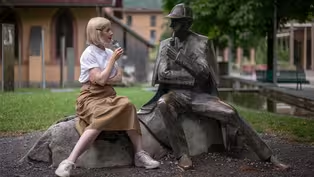
Janice Allan
Clip: Episode 3 | 3m 35sVideo has Closed Captions
Lucy Worsley and Professor Janice Allan discuss the shift in Arthur's writing.
There's a lot of weirdness in the later Sherlock Holmes stories – the Casebook of Sherlock Holmes. There are vampires, even a bit of science fiction. To Sherlock Holmes fans who liked Holmes’s rationality, this must have seemed like a really strange new departure? Lucy explores the story ‘The Creeping Man’ with Professor Janice Allan.
Problems playing video? | Closed Captioning Feedback
Problems playing video? | Closed Captioning Feedback

Janice Allan
Clip: Episode 3 | 3m 35sVideo has Closed Captions
There's a lot of weirdness in the later Sherlock Holmes stories – the Casebook of Sherlock Holmes. There are vampires, even a bit of science fiction. To Sherlock Holmes fans who liked Holmes’s rationality, this must have seemed like a really strange new departure? Lucy explores the story ‘The Creeping Man’ with Professor Janice Allan.
Problems playing video? | Closed Captioning Feedback
How to Watch Lucy Worsley's Holmes vs. Doyle
Lucy Worsley's Holmes vs. Doyle is available to stream on pbs.org and the free PBS App, available on iPhone, Apple TV, Android TV, Android smartphones, Amazon Fire TV, Amazon Fire Tablet, Roku, Samsung Smart TV, and Vizio.
Providing Support for PBS.org
Learn Moreabout PBS online sponsorship♪ There's a lot of weirdness in the later Sherlock Holmes stories.
There are vampires, bit of sci-fi, bit of horror.
To Sherlock Holmes fans who liked Holmes' rationality, this must have seemed like a really strange new departure.
Had Arthur and Sherlock gone over to the dark side?
[Bird squawking] ♪ [Whooshing and wailing] Someone who's embraced this weirdness is Professor Janice Allan.
Worsley: Why do the Sherlock Holmes stories in the 1920s turn dark?
I think the potential for darkness was always there in Doyle, but there's no doubt that it comes to the fore in the later stories, and I think it's safe to say that those stories reflect the horror and the trauma of the war, so we get irrational and violent behavior, and we get men, women, even children, acting like wild beasts, doing terrible things to each other.
In "The Retired Colourman," you have a gas chamber that a man builds in his house to murder his adulterous wife.
That's almost like a horror story.
It's not very family- friendly entertainment.
It isn't.
It isn't.
We also see in the post-war stories a proliferation of damaged and mutilated bodies.
Oh, war trauma in fiction.
Absolutely, absolutely.
Tell me about the story that I think of as being about Viagra.
This is from "The Creeping Man," which is probably one of the best known stories from "The Case-Book of Sherlock Holmes."
The elderly scientist in question, Professor Presbury, has fallen in love with a younger woman who objects to the age difference between them.
Trying to reverse the effects of time, Presbury starts to inject himself with monkey serum, in effect to kind of regain his vitality and his youth.
Now, as mad as that actually sounds, there was a craze in the 1920s for older elderly men to even have transplanted into their systems monkey testicle as a kind of miraculous regeneration cure... Yeah.
but in this story, the monkey serum actually makes Professor Presbury revert into something like a monkey, a lower life form.
It's so horrific.
I know.
He starts creeping along the corridors...
He does.
He's walking on all fours.
climbing up things.
Well, he climbs up very disturbingly to his daughter's window... Yeah.
and what Doyle seems to be suggesting is that Presbury has turned away from all the higher elements that make us human, and has debased himself in materialism and sensuality.
Janice, I think these 1920s stories are really brilliant, but they don't have a good reputation, do they, in the Sherlock Holmes canon?
They don't.
Two of the features that made the earlier stories so popular, you had an almost infallible detective who offered certainty, answers, and you had a depiction of England as a strong, healthy nation.
Both of those features are missing from many of the postwar stories, so instead of that, what we get are damaged psyche, moments of almost existential angst.
Readers didn't know what to do with that, and they didn't like it.
Video has Closed Captions
Clip: Ep3 | 3m 12s | Does Arthur’s science stand up to scrutiny when trialed and tested? (3m 12s)
Video has Closed Captions
Clip: Ep3 | 3m 34s | Arthur turns his attention to devising a new Holmes story set just before the war: "His Last Bow." (3m 34s)
Video has Closed Captions
Clip: Ep3 | 3m 27s | Sherlock Holmes is back from the dead! How did the fictional sleuth survive the Reichenbach Fall? (3m 27s)
Providing Support for PBS.org
Learn Moreabout PBS online sponsorshipSupport for PBS provided by:


















